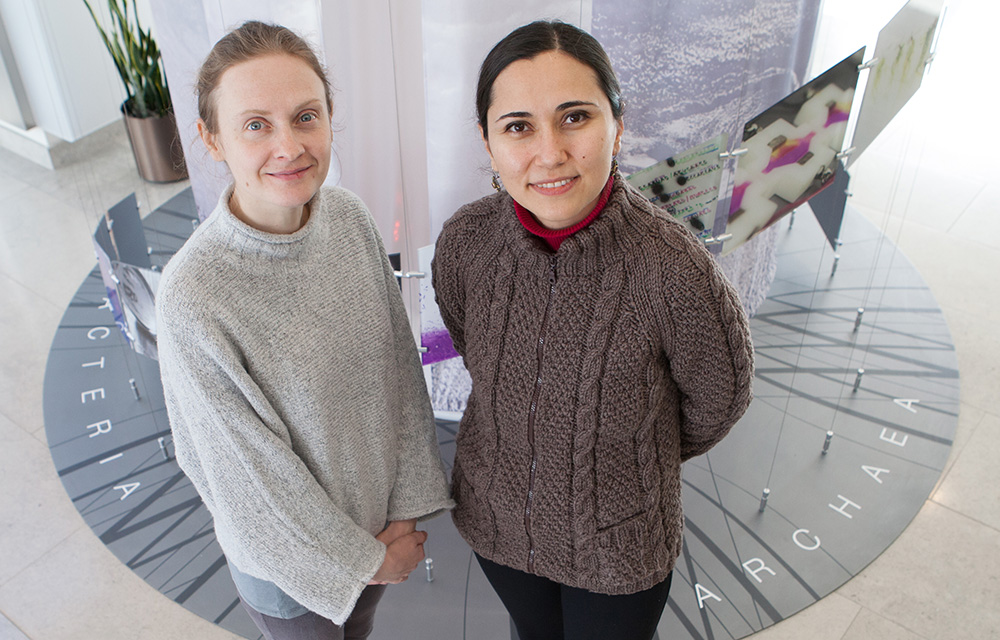As a result of intersecting research interests in women’s health, a new collaboration was forged between Zeynep Madak-Erdogan (GSP/ONC-PM), Assistant Professor in Food Science and Human Nutrition, and Justina Zurauskiene (ONC-PM), Birmingham-Illinois Partnership for Discovery, Engagement and Education (BRIDGE) fellow and fellow at the Institute of Cancer and Genomic Sciences in Birmingham, England. Founded in 2014, the BRIDGE program is an ongoing partnership between the University of Birmingham and the University of Illinois at Urbana-Champaign. The goal of the program is to provide a platform for exchange of creative knowledge through research and academic excellence, with the goal of addressing major global challenges.

Zurauskiene will be working with Madak-Erdogan for one year, where she plans to harness her computational biology expertise for generating and analyzing diverse datasets. Emphasis will be placed on health disparities in pregnant women and environmental factors that impact birth.
“We are focusing on gestational diabetes, a type of diabetes that appear in pregnant women who didn’t have the condition before,” said Madak-Erdogan.
“This disease is multifaceted. Once pregnant women develop the disease, the ball starts rolling and these women are at greater risk of developing Type II diabetes and so require more frequent monitoring of their health. They are also at risk of developing cardiovascular diseases later in life - so lot of long-term risks,” explained Zurauskiene.
The researchers pointed out that the baseline for levels of the detected predictors of the disease might be variable across different races. Given that the majority of the tests are developed in Caucasian populations, the diagnostic tests represent one of the gaps or health disparities associated with this condition.
“We are partnering with a local public health department in Champaign-Urbana and they have a clinic within the department called Women Infants Children (WIC) Clinic. Their clientele are women who come from less advantaged backgrounds or don't have such a good medical care plan,” said Zurauskiene. “We will be recruiting those women and hope to target a diverse population.”
“Based on our findings, we will move forward towards finding better, universal markers for the disease that can be informative independent of race or ethnicity,” said Madak-Erdogan.
Once patient recruitment is finalized and samples collected, the researchers will use metabolomics to separate chemicals in the blood and identify them using gas chromatography-mass spectrometry (GC-MS) since diabetes is a metabolism-associated disease.
“In the long run, we would love to look into any changes in DNA that might be associated with the condition and any changes that come from the message of DNA or mRNA for example that might have differences,” said Madak-Erdogan. “In an ideal world, we would have the biomarkers or indicators for the disease in a couple of years. The idea is to develop biosensors (in partnership with Illinois engineers) that can be used by anyone who is in the public health department or works in the field so that we have a cheap way of identifying this risk early on.”
“We would like to measure how sugars are changing in these pregnant women. We are developing some pipelines on how to process the data and how to do quality control, how to clean it and fill in missing values, and extract some patterns from the data,” explained Zurauskiene.
Given that sugars taken in during pregnancy are redirected to the developing baby, perspective mothers are less efficient at using glucose. Due to exposure to higher levels of glucose in the uterus, the baby is also at higher risk of developing obesity, Type II diabetes, and cardiovascular disease. More than ever, robust diagnostic tests are crucial to take necessary precautions early in development.
“The impact will be great given that obesity is rising and we are now learning more and more that exposures in the uterus are actually changing the outcomes for the baby,” said Madak-Erdogan. “We are trying to catch these things as early as possible so that the future generations are healthier and you know, they are born with a biology that is less prone to these problems later in life.”
This research is supported by Agricultural, Consumer and Environmental Sciences-Division of Nutritional Sciences Vision 20/20, United States Department of Agriculture-National Institute of Food and Agriculture, and the BRIDGE Fellowship.
